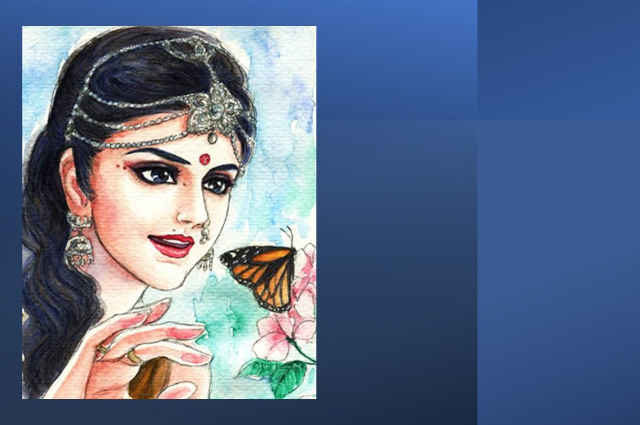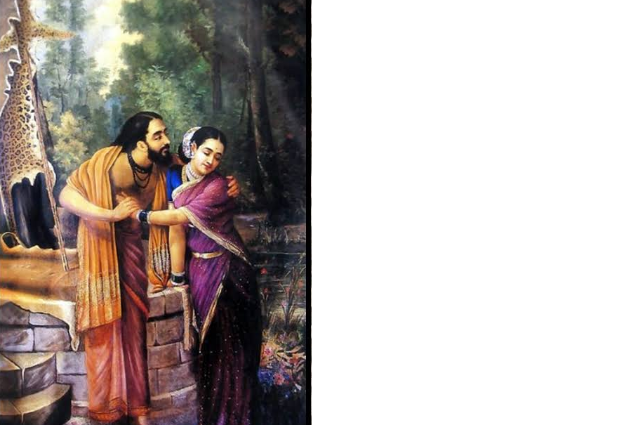
Satyavati, you might know her as wife of Shantanu, the great grandmother of Pandavas and Kaurava princes, the cause of celibacy oath of her step son Bhishma. Her boundless beauty and musky fragrance is described as a reason igniting flames of love between her and reigning king Shantanu. Even being in love, she chooses to adopt a pragmatic approach, when she gets introduced by Bhishma, the son of Shantanu and Ganga. Bhishma being elder, and potential heir of the kingdom , she pictures what her fate would be as a step mother and denies the marriage to king. The king madly captivated in her love, finds it arduous to survive the trauma, and what follows is the very famous celibacy oath of Bhishma. Following the celibacy oath, the marriage happens and she becomes mother of two-Chitrangada and Vichitravirya. Chitrangada dies in an early age, while Vichitravirya does not survive much either after being crowned as the king. The two wives of Vichitravirya, Ambalika, and Ambika are left childless predisposing them to the much prelevant Sati Pratha in that era. In the heat of moment, Satyawati takes a decision to call her Rishi son ‘Ved-Vyas’ with Rishi Parasar (before her marriage), to practice Niyoga. Satyavati, no doubt has been portrayed in a shrewd, vile, manner. Her image of ‘Femme Fatale’ is well circulated by daily soaps, movies and reinterpretations of Mahabharata.
Satyavati to me someone who denies to conform to social norms and ends up changing the fate of whole Kuru kingdom. Though Mahabharata boasts of line-up of many women defying customs, Amba, Gandhari, Kunti, Draupdi and many. I found her different, had risen from fisher folk to become Kuru matriarch, she comes across a woman with lethal combination of wit and glamour, no wonder why King Shantanu was driven crazy. Even though her acts are described as manipulative and calculated, her decisions come accross as practical ones , when one happens to look back at the atrocities step mothers went through. She rather appears to be strong headed and ambitious woman. When Vichitravirya died, Satyavati was left with two widows and a celibate step son, along with vacant throne of Hastinapur. With neighbouring kings casting lustful glances at both the heirless throne and the widowed princesses, Satyavati took a fateful decision. The ‘Manu smriti’ allowed a special concession to childless women whose husbands were infertile. She could request a family member to impregnate her. Total secrecy was observed to protect the honour of the woman. It was considered an act of duty and not of lust or sin. Satyavati decided to use ‘Niyoga for her widow daughter-in-laws. The news of pregnancy had to be announced with the declaration of the emperor’s unfortunate death. She twisted the rules in such a way that she resolved the succession crisis in Hastinapur as well as protecting her daughter in laws.

At a very young age she tackles the persistent sage (Rishi Parasar) with great maturity and presence of mind. She is not deluded by the belief that the sage will marry her and asks for virginity to ensure her future status in society. The sequence of her demands: the bodily fragrance to make the sexual act pleasant for both, the veil of mist to keep the act a secret, virginal status for her future and fame for her child – securing his fame and after practical aspects are sorted out, "eternally feminine" boons of lifelong youth and fragrance, might be associated with a wicked personality, but one can't deny she was beauty with brains.
She is an embodiment of the driving force of womanhood, with motherly ambition blinding her vision at every turn. For Satyavati the end mattered, not the means. Her actions (and decisions) created a generation encompassed by a greed ultimately leading to its annihilation.
Undoubtedly Satyavati was an unconventional woman, with her own flaws, maybe a cunning, shrewd, power hungry woman, but much ahead of her times, having her ambitions, courage to live them, who happened to change the course of history.
